Additional information
| Publisher | Edge Enterprises, Inc. |
|---|---|
| Year Printed | 2005 |
| Includes | Manual and CD |
$44.00
| Publisher | Edge Enterprises, Inc. |
|---|---|
| Year Printed | 2005 |
| Includes | Manual and CD |
Overview
The SCORE Skills are five basic social skills used by students in cooperative group activities. They include the following skills: Sharing Ideas, Complimenting Others, Offering Help or Encouragement, Recommending Changes Nicely, and Exercising Self Control. The research was conducted in 18 fifth-grade general education classes. The 18 teachers of these classes were randomly assigned to one of three groups. Six teachers used this CD program (hereafter referred to as the “multimedia workshop”) to learn how to provide instruction in the SCORE Skills. They taught a total of 101 students the SCORE Skills. Six other teachers simply read the instructor’s manual for the SCORE Skills program and taught the skills to their 93 students. Six additional teachers and their 114 students served as comparison classes. The comparison teachers did not teach the SCORE Skills to their students.
Results
Measures were gathered on the fidelity of the teachers’ implementation of the instruction and quality of instruction for teachers in the multimedia-workshop group and the manual-only group. The mean percentage scores for the two groups of experimental teachers are shown in Figure 1. T-tests revealed significant differences between the two groups, with higher scores for the multimedia workshop group on the implementation measure, t(5) = 4.227, p = .008, and on the quality of instruction measure, t(5) = 3.576, p = .016.
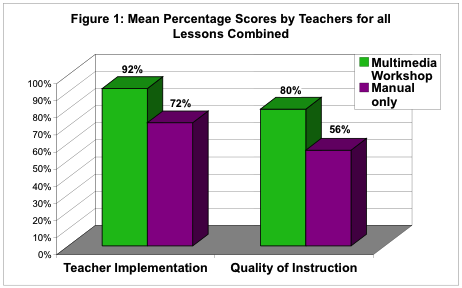
Figure 2 displays the mean percentage scores the multimedia-workshop and manual-only teachers earned on a test of their knowledge of the SCORE Skills and the instructional methods associated with teaching the SCORE Skills . A t-test for independent groups revealed no significant differences, t(5) = 1.908, p = .115, between the groups.
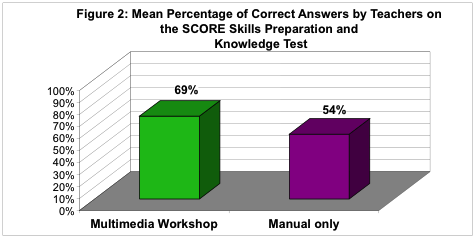
Figure 3 displays the mean percentage scores earned by students of the three groups of teachers on a written test of their knowledge of the SCORE Skills. The data were analyzed comparing the three groups of students’ raw posttest scores while controlling for the pretest scores. The results showed that the adjusted mean scores on the posttests were significantly different, F(2,14) = 82.510, p < .001, η2= .922. Follow-up comparison tests were computed. Significant differences were found between the comparison and the multimedia-workshop groups, p = .001, and between the comparison and the manual-only groups, p = .001. The posttest scores of the multimedia-workshop group and the manual-only group were not statistically different from each other.
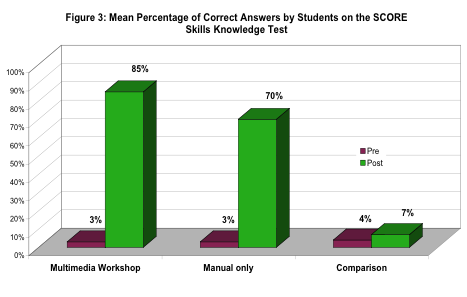
Figure 4 displays the mean percentage of points earned by students as they role-played situations with the researchers. All of the situations required the use of one of the SCORE Skills. GLMM results indicated that the multimedia-workshop and manual-only groups earned significantly higher scores than the comparison group, F(2, 14) = 9.627, p = .002, η2 = .579. Follow-up tests revealed a significant difference between the posttest scores of the comparison and the multimedia-workshop groups, p = .002. No other differences were found.
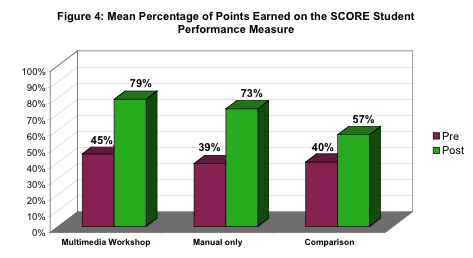
Conclusions
These results show that the Professional Development CD Program is effective in instructing teachers in how to teach the SCORE Skills to students. The levels of implementation and quality of instruction of teachers who used the CD program were significantly higher than those of teachers who only read the instructor’s manual. Although there were no significant differences between the two groups of experimental students, the students of the teachers who used the CD program performed better than the students of the manual-only students on both student measures. Both groups of experimental students performed significantly and substantially better than the comparison students on both measures. Thus, not only is the CD program effective with teachers, the instructional program associated with the SCORE Skills is effective in producing student change.
Reference
Vernon, D.S. (2001). Effects of a professional development software program for the SCORE Skill: Social Skills for Cooperative Groups Program: Progress Report. SBIR Phase II #R44HD36139. Washington, D.C.: National Institute of Child Health and Human Development.
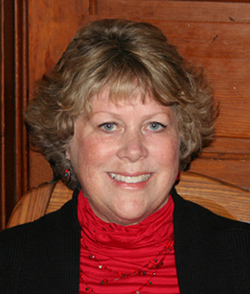
D. Sue Vernon, Ph.D.
Affliations
My Background and Interests
By wearing my different hats (a university instructor, a certified teaching-parent, a trainer and evaluator of child-care workers, a SIM professional development specialist, a parent of three children (one with exceptionalities), and a researcher), I have gained knowledge and experience from a number of perspectives. I have a history of working with at-risk youth with and without exceptionalities (e.g., students with learning disabilities, emotional disturbance, behavioral disorders) in community-based residential group-home treatment programs and in schools. I also have extensive experience with training, evaluating, and monitoring staff who work with these populations, and I have conducted research with and adapted curricula for high-poverty populations. In addition to the SCORE Skills program and other Cooperative Thinking Strategies programs, I’ve developed and field-tested interactive multimedia social skills curricula, community-building curricula, communication skills instruction, and professional development programs. I have also developed and validated social skills measurement instruments. As a lecturer of graduate-level university courses in the Department of Special Education at the University of Kansas, I have taught courses designed to enable teachers to access and become proficient in validated research-based practices.
The Story Behind the SCORE Skills Professional Development CD
My focus for the last 30 years has been on helping youths learn, and especially on helping them learn how to use social skills. My interest in social skills instruction began when I was a teaching-parent in a group home for adolescents who had a history of social problems. Clearly, those youths had not learned the social skills they needed to be successful in today’s world. Nevertheless, experience showed they could learn to use social skills well, given the right type of instruction. Later, I was the co-founder and Director of Training and Evaluation of the Teaching-Family Homes of Upper Michigan, originally developed through funding from the Michigan State Department of Mental Health and Father Flanagan’s Boys Home. This new agency eventually provided services to over 1,000 youths per day in schools, residential group homes, regional treatment centers, treatment foster homes, schools, and in counseling centers. My primary responsibility in this position was teaching adults (e.g., parents, teachers, foster parents, counselors) to teach social skills to children, and everyday I witnessed these adults successfully teaching the various skills to the youths in their care. Unfortunately, the population receiving instruction was often children who were already involved in the juvenile justice “system.” They were in trouble and had been removed from their homes. As I watched their growing success, I wanted to find a way to introduce social skills instruction as a way to preventsocial problems – I wanted to teach children alternative ways of behaving that would help them not only to stay out of trouble but also to create and maintain relationships. I thought the perfect place to prevent problems would be in the general education classroom beginning in elementary school.
As a result, a whole line of research on social skills instruction in classrooms was born. During my dissertation research, I began observing and recording social interactions as students worked in cooperative groups (and I was appalled at how the students treated one another – especially how other students treated students with exceptionalities). I surveyed teachers and found that they actively supported social skills instruction and had specific types of skills in mind that they wanted their students to learn. For example, they wanted their students to learn some basic interaction skills, so the students could productively complete a cooperative learning activity. They also wanted a way to systematically teach those skills to the whole class. Thus, my colleagues and I developed and tested the SCORE Skills program in general education classrooms. Our goal was to develop a program that benefited students with and without exceptionalities. We wanted students to learn ways to cooperate with each other that they could use in their future lives, such as in post-secondary schools, work, and community situations. Once the SCORE Skills Program was developed and shown to be effective, we wanted to provide an inexpensive way for teachers to learn how to teach the LEARN Strategy. Thus, the SCORE Skills Professional Development CD was born. It contains step-by-step instructions on how to teach the SCORE Skills along with videoclips of a teacher teaching the skills.
The SCORE Skills are five basic social skills that can be used anywhere to develop good relationships with others. Additionally, they are especially useful when involved in cooperative activities. Thus, they are the foundation skills for the other Cooperative Thinking Strategies, like the THINK Strategy, the LEARN Strategy, the BUILD Strategy, and the Teamwork Strategy. They should be learned by students before they learn the other Cooperative Thinking Strategies.
My thoughts about SCORE Skills Instruction
I have observed the SCORE Skills program being used with different populations in elementary and middle schools and in group-home settings. I believe the program can be adapted to a variety of settings. Several years ago, a graduate student did research using the SCORE Skills program with adolescents with Autism Spectrum Disorder. She has been successfully using the program with this population since receiving her Ed.D., her research has been published, and she has presented her experiences and research results at national and international conferences. In teaching my university classes, if I am assigning cooperative tasks, I always spend time outlining my expectations for how the group members should work together. While those expectations are framed differently (e.g., instead of “sharing,” I may talk about “synthesizing”), they are nevertheless a slightly more sophisticated variation of the SCORE Skills. I believe there are many individuals (including adults) who can benefit from social skills instruction.
Teacher and Student Feedback about SCORE Skills Instruction
Students and teachers have told me and other staff members that this is a popular program. When we asked students in two fourth-grade classrooms if they would like to tell us on camera about their experience with the SCORE Skills program that semester, all eight students with exceptionalities volunteered. Their comments have become part of the SCORE Skills Professional Development CD. My favorite comment was from a student who had significant peer relationship problems before participating in the program. He told us that he loved the SCORE Skills, that he was busy teaching them to his family, and that “if everyone used the SCORE Skills, the world would be a better place.”
My Contact Information
Please contact me at svernon2@windstream.net

 SCORE Skills: Social Skills for Cooperative Groups (Instructor’s Manu...
SCORE Skills: Social Skills for Cooperative Groups (Instructor’s Manu...